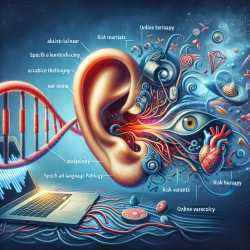In the evolving landscape of pediatric neuropsychology, data-driven decisions and targeted interventions are critical for optimizing outcomes for children. The research presented in the "AAPdN Virtual Conference – Accepted Abstracts" highlights significant findings that can be translated into practice to improve the neurocognitive health of pediatric populations. This blog will explore key insights from the research and provide actionable recommendations for practitioners.
Understanding Neurocognitive Late Effects in Pediatric Cancer Survivors
The study titled "Targeted Neurocognitive Assessment with Pediatric Cancer Survivors" by Abrego et al. (2022) sheds light on the neurocognitive impairments experienced by childhood cancer survivors due to treatment-related toxicity. Approximately 35% to 60% of these survivors face late effects that necessitate practical and efficient neuropsychological evaluations.
Key Findings:
- 32% of participants demonstrated neurocognitive impairment post-treatment.
- Significant differences were observed in non-verbal and overall IQ, semantic verbal fluency, and fine-motor speed between impaired and non-impaired groups.
- Participants with impairments were recommended for comprehensive evaluations, with a 38% follow-up rate.
Actionable Recommendations:
- Implement targeted neurocognitive assessments in clinical practice to efficiently identify children at risk of neurocognitive impairments.
- Utilize fixed/targeted batteries to assess general intellect, processing speed, working memory, executive functioning, verbal fluency, and fine motor speed.
- Encourage follow-up comprehensive evaluations for children identified with impairments to ensure ongoing support and intervention.
Addressing Neurocognitive Effects of COVID-19 in Children
Another significant study, "Neurological and Neuropsychological Functioning of SARS-CoV-2 Meningoencephalitis: A Case Study" by Aylward et al. (2022), examines the long-term neurocognitive effects of severe COVID-19 illness in children. This case study highlights the importance of understanding and addressing the neurocognitive sequelae of COVID-19 in pediatric populations.
Key Findings:
- Neuroimaging showed edema/inflammatory changes in the brain, with significant neurocognitive deficits in memory, executive function, working memory, and processing speed.
- Significant anxiety developed post-illness, complicating recovery.
Actionable Recommendations:
- Conduct thorough neuropsychological evaluations for children recovering from severe COVID-19 to identify and address neurocognitive deficits early.
- Incorporate mental health support as part of the recovery plan to address anxiety and other psychological effects post-illness.
- Promote further research into the long-term neurocognitive effects of COVID-19 in children to develop targeted interventions.
Encouraging Further Research and Practice Improvements
The findings from these studies underscore the importance of targeted assessments and follow-up evaluations in pediatric neuropsychology. Practitioners are encouraged to integrate these insights into their practice to enhance the quality of care for children experiencing neurocognitive impairments due to cancer treatments or severe COVID-19 illness.To read the original research paper, please follow this link:
AAPdN Virtual Conference – Accepted Abstracts.










